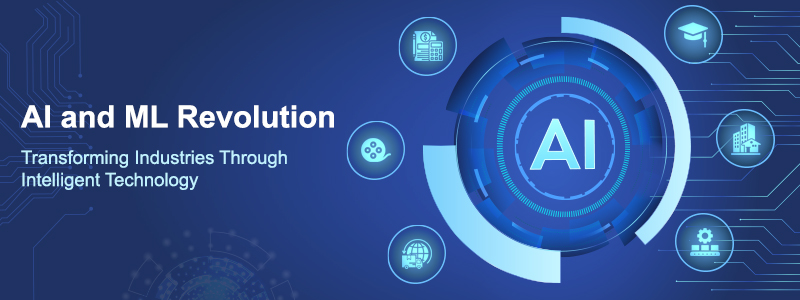
Artificial intelligence is a branch of computer science dealing with the simulation of intelligent behavior in computers and has evolved into a formidable tool in recent years, allowing machines to think and act like humans. Furthermore, it has piqued the interest of IT organizations all over the world and is regarded as the next significant technology revolution following the rise of mobile and cloud platforms. Some have even referred to it as the “fourth industrial revolution”.
Today, AI is disrupting industries, transcending boundaries, and propelling businesses to new heights of success, innovation, and efficiency. Not to mention, AI is helping CIOs, CTOs, and IT directors in navigating the fast-evolving landscape of digital transformation. Since the beginning of the AI revolution, the demand for custom AI product development has surged dramatically. These modern solutions allow businesses to drive workforce productivity, automate repetitive tasks, enhance customer experience, analyse large volumes of data, and make better business decisions. This may be one of the reasons why the global adoption rate of AI has more than doubled. Here is some detailed information or we can say that how AI helps in specific fields for their optimization.
1. AI in Logistics and Supply Chain:
Artificial Intelligence (AI) is bringing a paradigm shift in the logistic and supply chain industry by delivering the robust optimization capabilities required for demand forecasting, predictive maintenance, intelligent decision-making, increasing productivity, improving operational efficiencies, lowering supply chain costs, and supply chain automation.
2. AI in Entertainment:
The entertainment industry is one of the early adopters of AI that witnessed significant advancements in various aspects such as content creation, distribution, and consumption. Today, a large number of organisations are leveraging the potential of Artificial Intelligence for content personalization, improving user experience, and building a strong brand presence.
3. AI in Banking and Finance:
The banking and finance industry relies heavily on data, and AI can help banks and financial institutions process huge volumes of data, identify patterns and insights hidden in large datasets, and make informed decisions. In other words, AI can transform the way banking and finance institutions interact with customers, manage monetary regulations and day-to-day transactions, and scale their investments and revenue. Besides this, AI implementation in banking and finance can help businesses in fraud detection, managing risk, analysing market sentiments, improving back-office operations, automating repetitive tasks, and collecting data for analysis.
4. AI in Education:
AI-assisted learning methodologies are transforming the education industry at scale. Using Artificial Intelligence, educational institutions can personalise the learning experience for students based on the data collected from their test results, exercise completion time, interaction with educational materials, and overall performance.
5. AI in Real Estate:
Artificial intelligence is transforming the real estate industry by unlocking a sea of opportunities for brokers, agents, and clients. Using Artificial Intelligence, real estate professionals can analyse and predict property valuations, rental yield, market conditions, and other critical aspects influencing the real estate market.
6. AI in Manufacturing:
AI has emerged as a game-changer in the manufacturing industry by revolutionizing operations across product assembly, inventory management, quality assurance, equipment predictive maintenance, and defect Inspection. Using AI, manufacturers can not only optimise processes, make intelligent decisions, and address operational challenges but also attain unmatched levels of productivity, efficiency, and accuracy.
In the end we can say that Artificial Intelligence is the technology that we can keep in the same bracket as fire, aeroplane, telephone and computer. It is going to be the next big thing in this century. It is here for disruption, which has already begun. With technologies like machine learning, deep learning, computer vision, and predictive analytics, AI in business is tapping steadily to redefine various operations, whether in the supply chain sector or education. What remains to be seen is how businesses approach fleet-footed AI advancements — in terms of — innovation and skills. We can conclude this by saying that every good things come with some drawbacks also. The drawbacks of AI include job displacement, ethical concerns about bias and privacy, security risks from hacking, a lack of human-like creativity and empathy.
Do You Need more information?
For any further information / query regarding Technology, please email us at info@varianceinfotech.in
OR call us on +1 630 534 0223 / +91-7016851729, Alternately you can request for information by filling up Contact Us
 Please wait...
Please wait...
Leave a Reply